人教版(2019)选择性必修二:Unit 2 Bridging Cultures 重难点讲解(学案)
文档属性
| 名称 | 人教版(2019)选择性必修二:Unit 2 Bridging Cultures 重难点讲解(学案) | 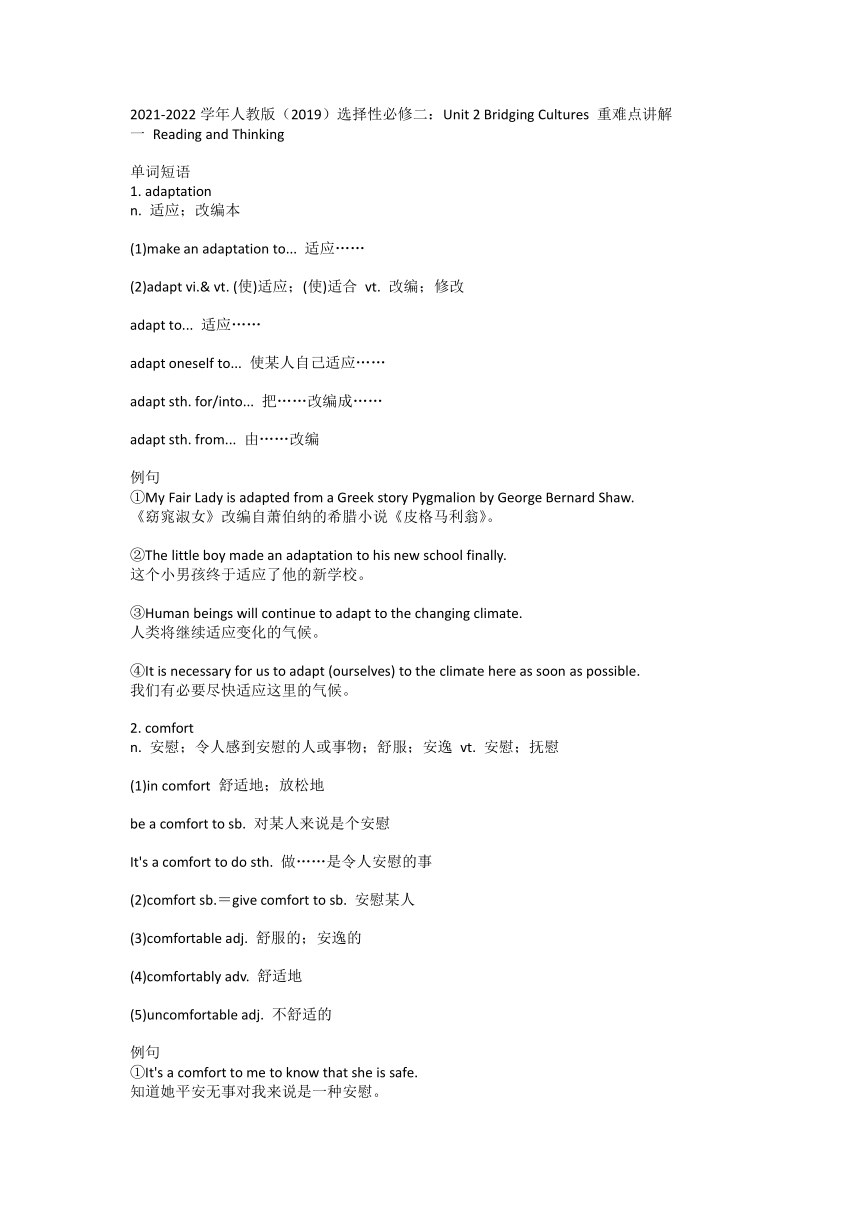 | |
| 格式 | doc | ||
| 文件大小 | 85.0KB | ||
| 资源类型 | 教案 | ||
| 版本资源 | 人教版(2019) | ||
| 科目 | 英语 | ||
| 更新时间 | 2021-09-09 15:22:18 | ||
图片预览

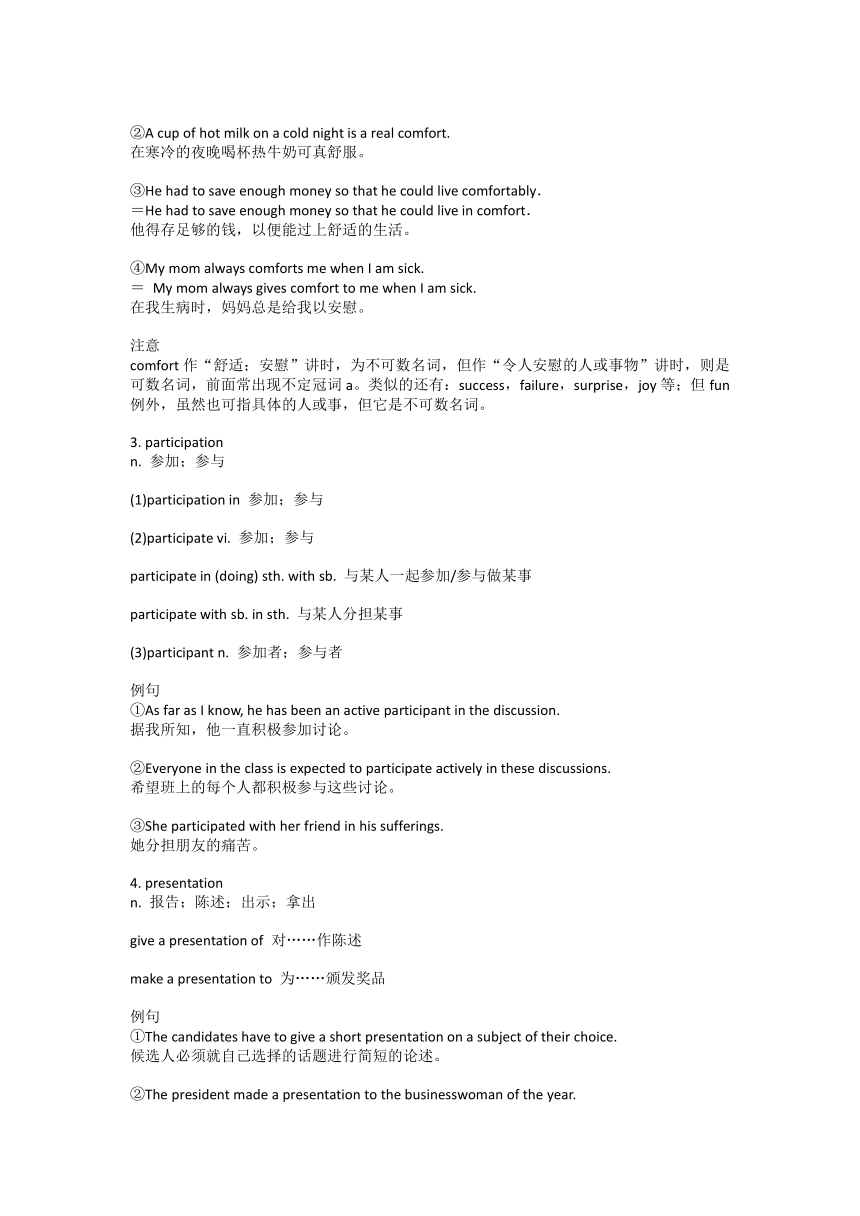
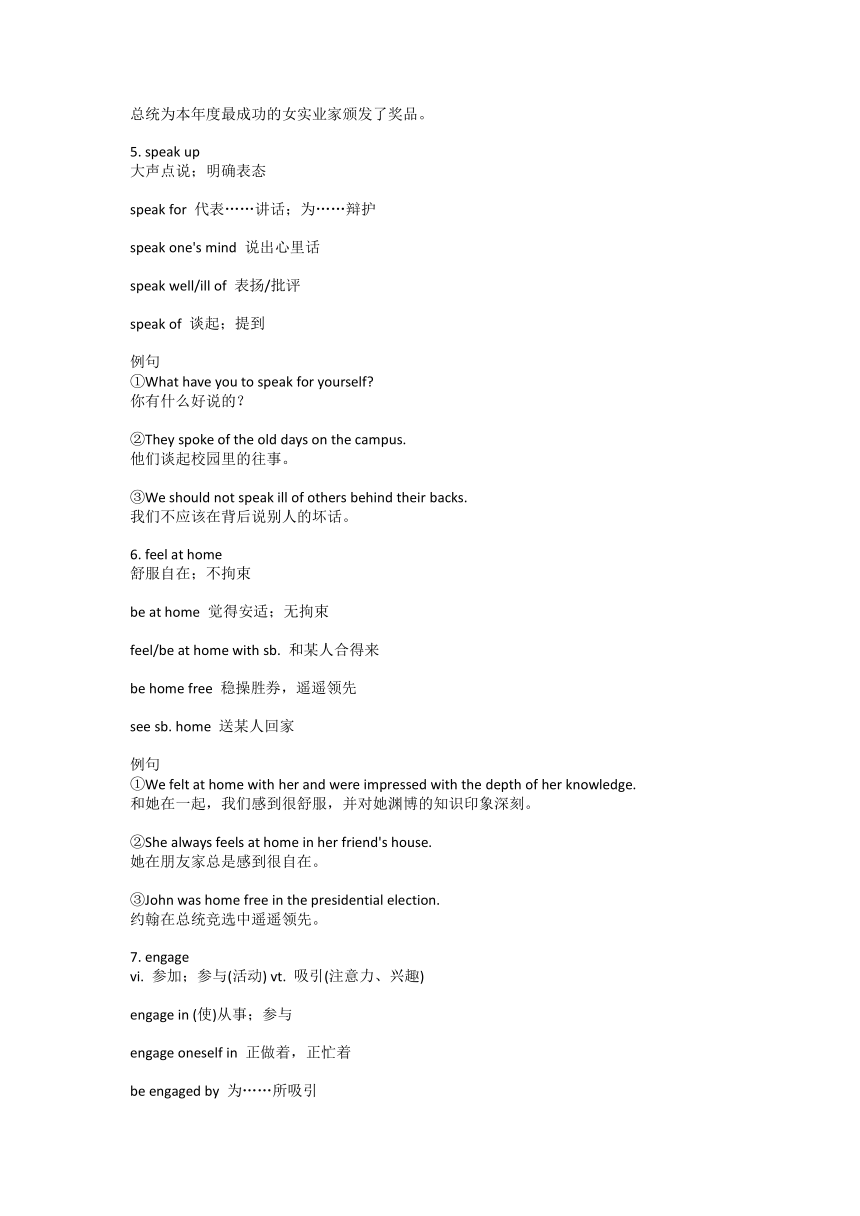
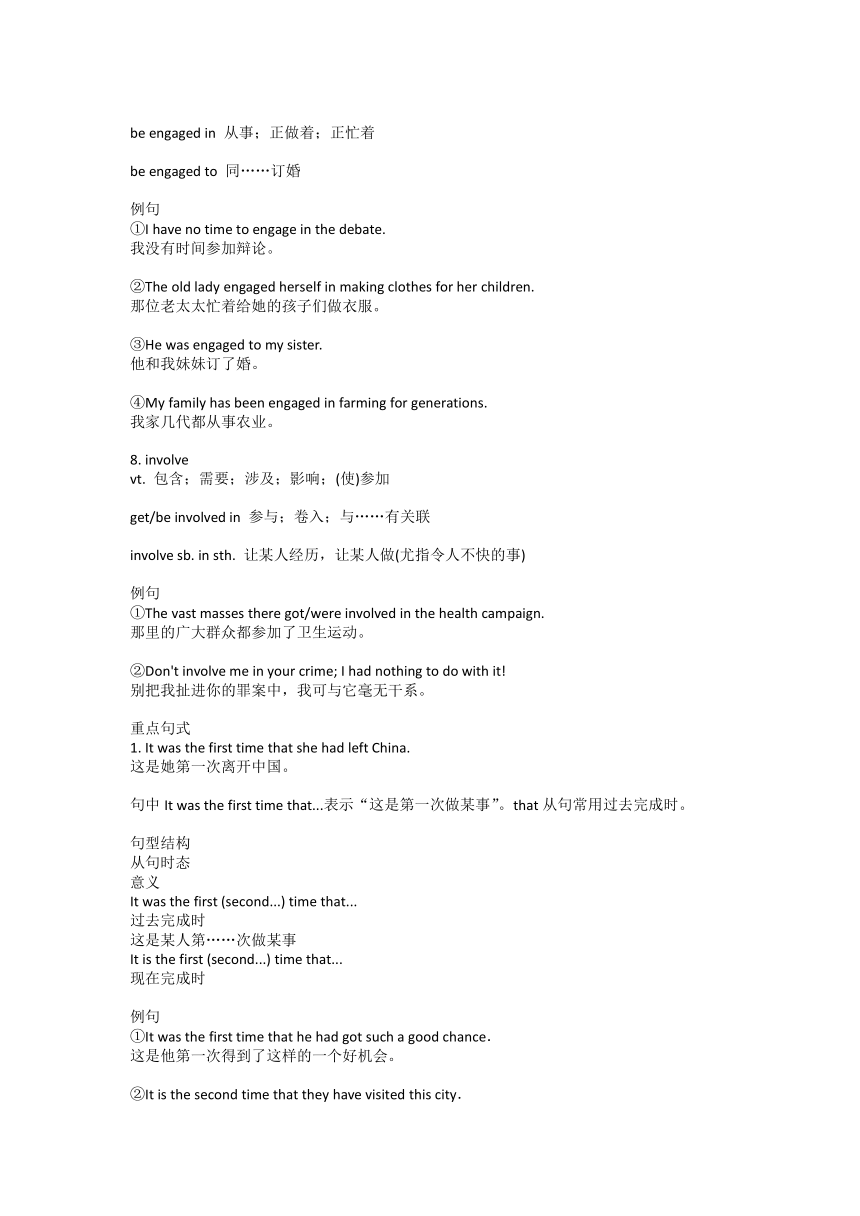
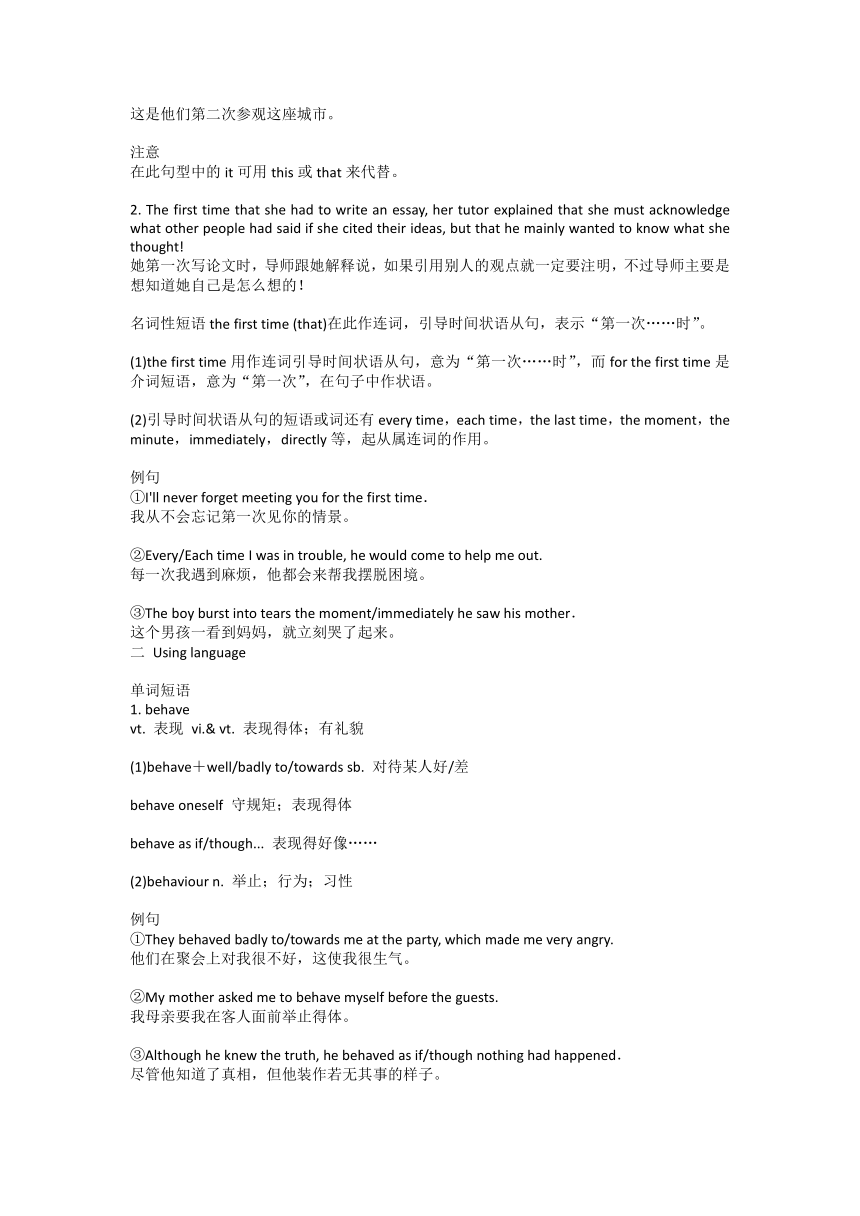
文档简介
2021-2022学年人教版(2019)选择性必修二:Unit
2
Bridging
Cultures
重难点讲解
一
Reading
and
Thinking
单词短语
1.
adaptation
n.
适应;改编本
(1)make
an
adaptation
to...
适应……
(2)adapt
vi.&
vt.
(使)适应;(使)适合
vt.
改编;修改
adapt
to...
适应……
adapt
oneself
to...
使某人自己适应……
adapt
sth.
for/into...
把……改编成……
adapt
sth.
from...
由……改编
例句
①My
Fair
Lady
is?adapted
from?a
Greek
story
Pygmalion
by
George
Bernard
Shaw.
《窈窕淑女》改编自萧伯纳的希腊小说《皮格马利翁》。
②The
little
boy?made
an
adaptation
to?his
new
school
finally.
这个小男孩终于适应了他的新学校。
③Human
beings
will
continue
to?adapt
to?the
changing
climate.
人类将继续适应变化的气候。
④It
is
necessary
for
us
to?adapt
(ourselves)
to?the
climate
here
as
soon
as
possible.
我们有必要尽快适应这里的气候。
2.
comfort
n.
安慰;令人感到安慰的人或事物;舒服;安逸
vt.
安慰;抚慰
(1)in
comfort
舒适地;放松地
be
a
comfort
to
sb.
对某人来说是个安慰
It's
a
comfort
to
do
sth.
做……是令人安慰的事
(2)comfort
sb.=give
comfort
to
sb.
安慰某人
(3)comfortable
adj.
舒服的;安逸的
(4)comfortably
adv.
舒适地
(5)uncomfortable
adj.
不舒适的
例句
①It's
a
comfort
to?me
to
know
that
she
is
safe.
知道她平安无事对我来说是一种安慰。
②A
cup
of
hot
milk
on
a
cold
night
is
a
real?comfort.
在寒冷的夜晚喝杯热牛奶可真舒服。
③He
had
to
save
enough
money
so
that
he
could
live?comfortably.
=He
had
to
save
enough
money
so
that
he
could
live?in
comfort.
他得存足够的钱,以便能过上舒适的生活。
④My
mom
always?comforts
me?when
I
am
sick.
=
My
mom
always?gives
comfort
to
me?when
I
am
sick.
在我生病时,妈妈总是给我以安慰。
注意
comfort作“舒适;安慰”讲时,为不可数名词,但作“令人安慰的人或事物”讲时,则是可数名词,前面常出现不定冠词a。类似的还有:success,failure,surprise,joy等;但fun例外,虽然也可指具体的人或事,但它是不可数名词。
3.
participation
n.
参加;参与
(1)participation
in
参加;参与
(2)participate
vi.
参加;参与
participate
in
(doing)
sth.
with
sb.
与某人一起参加/参与做某事
participate
with
sb.
in
sth.
与某人分担某事
(3)participant
n.
参加者;参与者
例句
①As
far
as
I
know,
he
has
been
an
active?participant
in?the
discussion.
据我所知,他一直积极参加讨论。
②Everyone
in
the
class
is
expected
to?participate
actively
in?these
discussions.
希望班上的每个人都积极参与这些讨论。
③She?participated
with?her
friend?in?his
sufferings.
她分担朋友的痛苦。
4.
presentation
n.
报告;陈述;出示;拿出
give
a
presentation
of
对……作陈述
make
a
presentation
to
为……颁发奖品
例句
①The
candidates
have
to?give
a
short
presentation?on
a
subject
of
their
choice.
候选人必须就自己选择的话题进行简短的论述。
②The
president?made
a
presentation
to?the
businesswoman
of
the
year.
总统为本年度最成功的女实业家颁发了奖品。
5.
speak
up
大声点说;明确表态
speak
for
代表……讲话;为……辩护
speak
one's
mind
说出心里话
speak
well/ill
of
表扬/批评
speak
of
谈起;提到
例句
①What
have
you
to?speak
for?yourself?
你有什么好说的?
②They?spoke
of?the
old
days
on
the
campus.
他们谈起校园里的往事。
③We
should
not?speak
ill
of?others
behind
their
backs.
我们不应该在背后说别人的坏话。
6.
feel
at
home
舒服自在;不拘束
be
at
home
觉得安适;无拘束
feel/be
at
home
with
sb.
和某人合得来
be
home
free
稳操胜券,遥遥领先
see
sb.
home
送某人回家
例句
①We?felt
at
home?with
her
and
were
impressed
with
the
depth
of
her
knowledge.
和她在一起,我们感到很舒服,并对她渊博的知识印象深刻。
②She
always?feels
at
home?in
her
friend's
house.
她在朋友家总是感到很自在。
③John?was
home
free?in
the
presidential
election.
约翰在总统竞选中遥遥领先。
7.
engage
vi.
参加;参与(活动)
vt.
吸引(注意力、兴趣)
engage
in
(使)从事;参与
engage
oneself
in
正做着,正忙着
be
engaged
by
为……所吸引
be
engaged
in
从事;正做着;正忙着
be
engaged
to
同……订婚
例句
①I
have
no
time
to?engage
in?the
debate.
我没有时间参加辩论。
②The
old
lady?engaged
herself
in?making
clothes
for
her
children.
那位老太太忙着给她的孩子们做衣服。
③He?was
engaged
to?my
sister.
他和我妹妹订了婚。
④My
family
has?been
engaged
in?farming
for
generations.
我家几代都从事农业。
8.
involve
vt.
包含;需要;涉及;影响;(使)参加
get/be
involved
in
参与;卷入;与……有关联
involve
sb.
in
sth.
让某人经历,让某人做(尤指令人不快的事)
例句
①The
vast
masses
there?got/were
involved
in?the
health
campaign.
那里的广大群众都参加了卫生运动。
②Don't?involve
me
in?your
crime;
I
had
nothing
to
do
with
it!
别把我扯进你的罪案中,我可与它毫无干系。
重点句式
1.?It
was
the
first
time
that?she
had
left
China.
这是她第一次离开中国。
句中It
was
the
first
time
that...表示“这是第一次做某事”。that从句常用过去完成时。
句型结构
从句时态
意义
It
was
the
first
(second...)
time
that...
过去完成时
这是某人第……次做某事
It
is
the
first
(second...)
time
that...
现在完成时
例句
①It
was
the
first
time
that?he
had
got
such
a
good
chance.
这是他第一次得到了这样的一个好机会。
②It
is
the
second
time
that?they
have
visited
this
city.
这是他们第二次参观这座城市。
注意
在此句型中的it可用this或that来代替。?
2.?The
first
time
that?she
had
to
write
an
essay,
her
tutor
explained
that
she
must
acknowledge
what
other
people
had
said
if
she
cited
their
ideas,
but
that
he
mainly
wanted
to
know
what
she
thought!
她第一次写论文时,导师跟她解释说,如果引用别人的观点就一定要注明,不过导师主要是想知道她自己是怎么想的!
名词性短语the
first
time
(that)在此作连词,引导时间状语从句,表示“第一次……时”。
(1)the
first
time用作连词引导时间状语从句,意为“第一次……时”,而for
the
first
time是介词短语,意为“第一次”,在句子中作状语。
(2)引导时间状语从句的短语或词还有every
time,each
time,the
last
time,the
moment,the
minute,immediately,directly等,起从属连词的作用。
例句
①I'll
never
forget
meeting
you?for
the
first
time.
我从不会忘记第一次见你的情景。
②Every/Each
time?I
was
in
trouble,
he
would
come
to
help
me
out.
每一次我遇到麻烦,他都会来帮我摆脱困境。
③The
boy
burst
into
tears
the
moment/immediately?he
saw
his
mother.
这个男孩一看到妈妈,就立刻哭了起来。
二
Using
language
单词短语
1.
behave
vt.
表现
vi.&
vt.
表现得体;有礼貌
(1)behave+well/badly
to/towards
sb.
对待某人好/差
behave
oneself
守规矩;表现得体
behave
as
if/though...
表现得好像……
(2)behaviour
n.
举止;行为;习性
例句
①They?behaved
badly
to/towards
me?at
the
party,
which
made
me
very
angry.
他们在聚会上对我很不好,这使我很生气。
②My
mother
asked
me
to?behave
myself?before
the
guests.
我母亲要我在客人面前举止得体。
③Although
he
knew
the
truth,
he?behaved
as
if/though?nothing
had
happened.
尽管他知道了真相,但他装作若无其事的样子。
2.
optimistic
adj.
乐观的
become
optimistic
变得乐观
be
optimistic
about
对……乐观
例句
①If
you
change
your
mind
and?become
optimistic,
you
can
change
your
life.
如果你改变自己的信念,变得乐观一些,你就能改变你的人生。
②He?is
very
optimistic
about?his
chance.
他对自己的机会非常乐观。
3.
gain
vt.
获得;赢得;取得;增加n.
好处;增加
gain...from/by...
从……中受益
gain
strength/weight/power/experience
增加力气/体重/能力/经验
gain
independence
(from
...)
(脱离……)获得独立
例句
①I?gained
a
lot
by/from?my
former
experience.
我从以前的经验中获得了很多。
②I'm
new
on
the
job,
but
I
am
already?gaining
experience.
对这个工作我是新手,但我已经在积累经验了。
③India?gained
its
independence?in
1947.
印度在1947年获得了独立。
4.
cooperate
vi.
合作;协作;配合
cooperate
with
(sb.)
in
(sth.)
和(某人)合作(某事)
cooperate
in
harmony
协调地合作;配合默契
例句
①The
two
companies
are?cooperating
in?the
development
of
a
new
engine.
这两家公司正在合作研制一种新发动机。
②The
two
groups
agreed
to?cooperate
with?each
other.
这两个组同意互相合作。
③Second,
it
let
me
know
how
to?cooperate
in
harmony?with
people
who
I
like
or
dislike.
其次,它让我学会了如何与自己喜欢或不喜欢的人团结合作。
重点句式
Cooperating
with
people
from
diverse
cultural
backgrounds?helps
us
view
the
world
from
different
angles
and
thus
gives
us
more
insight
into
our
own
culture.
与来自不同文化背景的人合作有助于我们从不同的视角看世界,进而让我们对自己的文化有更深入的了解。
句中Cooperating
with
people
from
diverse
cultural
backgrounds为动词?ing形式作主语。
(1)动词?ing形式是一种非谓语形式,其可以在句子中充当除谓语动词以外的多种成分,除了作主语外,还可以作宾语、表语等。
(2)动词?ing形式作主语时(特别是较长时),经常可以换用形式主语it的句式。
(3)动词?ing形式作主语时,谓语动词要用单数形式。
例句
①It
is
no
good?crying?over
spilt
milk.
牛奶泼掉了哭也没用。
②It
is
helpful?keeping?exercising
every
day.
每天坚持锻炼是有好处的。
③Learning?a
foreign
language
is
very
useful
to
everyone.
学习一门外语对每个人都很有用。
三
Grammar
名词性从句
名词性从句是在句子中起名词作用的句子。名词性从句的功能相当于名词词组,它在复合句中能担任主语、宾语、表语、同位语等,因此根据它在句中不同的语法功能,名词性从句又可分别称为主语从句、宾语从句、表语从句和同位语从句。
一、名词性从句的连接词
引导名词性从句的连接词有三个连词、五个连接代词、四个连接副词。
连接词词形词义在从句中所作的成分连词thatXXif/whether
是否X连接代词who(ever)
(无论)谁(主格)
主语、表语、宾语
whom(ever)
(无论)谁(宾格)
表语、宾语
whose(ever)
(无论)谁的(所有格)
定语
what(ever)
(无论)什么
主语、宾语、表语、定语
which(ever)
(无论)哪个
主语、宾语、定语
连接副词
when(ever)
(无论)什么时候
状语
where(ever)
(无论)在哪里
状语
how(ever)
(无论)怎样,怎么
状语
why
为什么
状语
二、主语从句
主语从句是指在句中作主语的从句,位置与陈述句的主语相同。
What
is
not
to
our
satisfaction
is
that
the
price
of
the
meal
is
a
little
too
high.
我们不满意的是饭菜的价格稍微有点高。
How
the
book
will
sell
depends
on
its
author.
这本书如何销售取决于作者本人。
Where
we
shall
have
the
meeting
makes
no
difference.
我们在哪儿开会都无所谓。
1.
that引导主语从句,在从句中不充当任何成分,仅起连接作用,但不可省略。
That
you
will
win
the
medal
seems
unlikely.
你想获得奖牌看起来是不可能的。
2.
whether引导的主语从句既可放在句首也可放在句尾,但if引导的主语从句只能放在句尾,前面需要用it作形式主语。
Whether
the
sports
meeting
will
be
held
is
not
certain
now.
运动会是否将举行现在不能确定。
Whether
the
work
can
be
completed
on
time
is
doubtful.
=It
is
doubtful
whether/if
the
work
can
be
completed
on
time.
这项工作能否按时完成还不确定。
3.
若主语部分结构较长,可以使用形式主语it,把真正的主语从句放于后面。
It
is
announced
that
our
school
is
going
to
start
an
activity
of
"Crazy
English"
before
daily
morning
exercises.
学校通知每日早操前将开展“疯狂英语”活动。
It
is
necessary
that
people
should
learn
to
face
the
reality.
人们应该学会面对现实是有必要的。
三、宾语从句
在主从复合句中作宾语的从句叫宾语从句。宾语从句在句中可以作及物动词、介词或一些形容词的宾语。
Everyone
knows
that
the
earth
is
made
up
of
matter.
每个人都知道地球是由物质构成的。
I
doubt
whether
he
will
be
elected
as
chairman.
我怀疑他是否会当选为主席。
These
two
areas
are
similar
in
that
they
both
have
high
rainfall
in
summer.
这两个地区相似,因为在夏天降水都很多。
I'm
not
certain
whether
the
train
will
arrive
on
time.
我不确信火车是否将会按时到达。
1.
that引导宾语从句,既无语法功能,也无词汇意义,常被省略。但多个并列从句出现时,第一个that可以省略,其他的不能省略。
She
said
(that)
she
would
come
here
and
that
I
should
wait
for
her
till
Monday.
她说她将会来这儿并让我等到星期一。
2.
if和whether引导宾语从句的区别:
①在动词不定式之前只能用
whether。
②在whether...or
not
的固定搭配中,只用
whether。
③在介词后,只能用whether。
④作
discuss
的宾语时,只能用
whether。
⑤宾语从句放在句首表示强调时,只能用
whether。
3.
带复合宾语(宾语+宾语补足语)的句子,that引导的宾语从句经常移到句子后面,而用it作形式宾语。
4.
表示喜欢、憎恶等心理活动的动词后习惯上先加个形式宾语it,再接宾语从句。例如:hate,dislike,love,don't
mind,feel
like,appreciate,rely
on,count
on,see
to等。
We
think
it
possible
that
you
can
finish
the
work
today.
我们认为你今天能够完成这项工作。
5.
宾语从句的否定转移:think,believe,suppose,imagine等动词后的宾语从句中的否定词要转移到主句中,即主句的谓语动词用否定式,而从句的谓语动词用肯定式。
I
don't
think
we
need
to
waste
much
time
on
it.
我想我们不必在这上面浪费太多时间。(形式上否定)
四、表语从句
表语从句在复合句中作表语,出现在连系动词之后,一般结构为“主语+连系动词+表语从句”。可接表语从句的连系动词有be,look,remain,seem等。
The
question
is
whether
we
can
finish
the
work
in
time.
问题在于我们是否能及时完成这项工作。
1.
that在引导表语从句时无词义,在从句中不充当任何成分,仅起连接作用,不可以省略。
The
fact
remains
that
we
are
still
not
advanced
enough.
事实依然是我们还是不够先进。
2.
whether可引导表语从句,但if却通常不用于引导表语从句。
His
first
question
was
whether
Tom
had
arrived
yet.
他的首要问题是汤姆是否已经到达。
3.
引导表语从句的引导词还可用because,as
if,as
though,as。
The
sky
is
overcast
with
dark
clouds.
It
seems
as
if
it
is
going
to
rain
soon.
天空乌云密布,似乎很快就要下雨了。
五、同位语从句
在复合句中用作同位语的从句叫同位语从句。它一般跟在某个名词后面,用来说明前面名词的具体内容。常见的这类名词有:fact,news,hope,truth,idea,suggestion,thought,question,promise,order,problem,belief,word,message,information,proof,announcement,desire,doubt,proposal,advice,possibility等。
The
news
that
he
was
admitted
to
Peking
University
is
exciting.
他被北京大学录取了的消息真是令人激动。
The
question
who
should
do
the
work
requires
consideration.
谁应当做这份工作,这个问题需要考虑。
I
have
no
idea
that
you
have
applied
for
the
post.
我不知道你已经申请了这个职位。
注意
同位语从句和定语从句的区别
同位语从句
定语从句
功能不同
对名词加以补充说明
与先行词是修饰与被修饰的关系,起连接作用
that
不作成分,只起连接作用,不可省略
作主语或宾语,起连接作用;并且作从句的宾语时可省略
whether/
how/what
起连接作用,其中whether不作成分,而how和what作成分
不引导定语从句
其他wh?-类词
作成分;起连接作用;有自己的含义,但与先行词无关
作成分;起连接作用;没有自己的含义,但是代替先行词在从句中作成分
Jim
got
to
know
the
news
that
the
whole
village
was
in
great
danger.
吉姆得知整个村子都处在极度危险中的消息。(that引导同位语从句,解释说明the
news的内容)
Do
you
know
the
news(that/which)Jim
told
me?
你知道吉姆告诉我的那个消息吗?(that/which引导定语从句,且在从句中作宾语)
四
Writing
如何写一封有争议性话题的信
文体指导
有争议性话题都是很容易引起大家关注的话题,并且是跟随着时代的潮流而来的话题。争议性话题当然有很大的争议性,写作时,你必然会有一个关于这个话题的态度,支持或反对。
基本框架
1.
开头——引出话题,综述大家对此话题的不同态度。
2.
主体——提出自己的观点,并对此话题的利弊进行深入的分析。
3.
结尾——总结自己的观点,扣题。
常用词块
1.
have
a
good
understanding
of
很好地理解或了解
2.
go
to
study
abroad
出国留学
3.
know
more
about
foreign
countries
更多地了解外国
4.
have
both
advantages
and
disadvantages
有优点也有缺点
5.
bring
serious
problems
带来严重的问题
6.
some
effective
measures
一些有效的措施
7.
make
the
most
of
充分利用
8.
witness
the
fast
development
of
见证了……的快速发展
常用语句
1.
I'm
writing
to
tell
you
about
my
opinion
on
Chinese
students
going
abroad
for
further
studies
at
an
early
age.
我写信是想告诉你我对中国学生留学低龄化的看法。
2.
It's
universally
acknowledged
that
computers
are
commonly
used
nowadays.
现在人们普遍使用电脑,这是公认的。
3.
Some
people
believe
that
students
should
be
given
one
long
vacation
each
year.Others
believe
that
students
should
have
several
short
vacations
throughout
the
year.
有些人认为学生每年应该有一个长假,另外有些人认为学生应该有几个短假。
4.
Some
effective
measures
should
be
taken
to
ensure
that
computers
are
used
in
right
ways.
应该采取一些有效的措施来确保电脑的正确使用。
5.
Only
in
this
way
can
we
improve
our
English.
只有这样,我们才能提高英语水平。
6.
And
this
has
aroused
hot
debate
recently.
最近这引起了热议。
学以致用
某英文报就近年来我国学生出国留学低龄化的利弊在报上展开讨论,希望广大读者畅所欲言,就此事发表自己的看法。假设你是中学生李华,请用英语给编辑写一封信,谈谈你的看法,并说明理由。80词左右。
注意:信的开头和结尾已给出,词数不计算在内。
Dear
editor,?
I'm
writing
to
tell
you
my
opinion
on
Chinese
students
going
abroad
for
further
studies
at
an
early
age.
Yours,?
Li
Hua
参考范文
Dear
editor,?
?
?
?
?
I'm
writing
to
tell
you
my
opinion
on
Chinese
students
going
abroad
for
further
studies
at
an
early
age.
?
?
?
?
The
education
in
China
and
that
in
foreign
countries
have
both
advantages
and
disadvantages.
The
most
important
thing
for
us
Chinese
students
to
do
at
present
is
to
know
our
country,
people
and
culture
well.
Besides,
going
to
study
in
foreign
countries
at
too
early
an
age
not
only
costs
a
lot
of
money,
it
could
also
bring
serious
problems.
Taking
care
of
themselves
is
one
of
them.
?
?
?
?
In
my
opinion,
as
primary
or
middle
school
students,
we
should
devote
our
time
to
studying
harder
in
our
own
country
and
improving
ourselves,
when
the
chance
to
study
abroad
arrives,
we'll
grasp
it.
Yours,?
Li
Hua
2
Bridging
Cultures
重难点讲解
一
Reading
and
Thinking
单词短语
1.
adaptation
n.
适应;改编本
(1)make
an
adaptation
to...
适应……
(2)adapt
vi.&
vt.
(使)适应;(使)适合
vt.
改编;修改
adapt
to...
适应……
adapt
oneself
to...
使某人自己适应……
adapt
sth.
for/into...
把……改编成……
adapt
sth.
from...
由……改编
例句
①My
Fair
Lady
is?adapted
from?a
Greek
story
Pygmalion
by
George
Bernard
Shaw.
《窈窕淑女》改编自萧伯纳的希腊小说《皮格马利翁》。
②The
little
boy?made
an
adaptation
to?his
new
school
finally.
这个小男孩终于适应了他的新学校。
③Human
beings
will
continue
to?adapt
to?the
changing
climate.
人类将继续适应变化的气候。
④It
is
necessary
for
us
to?adapt
(ourselves)
to?the
climate
here
as
soon
as
possible.
我们有必要尽快适应这里的气候。
2.
comfort
n.
安慰;令人感到安慰的人或事物;舒服;安逸
vt.
安慰;抚慰
(1)in
comfort
舒适地;放松地
be
a
comfort
to
sb.
对某人来说是个安慰
It's
a
comfort
to
do
sth.
做……是令人安慰的事
(2)comfort
sb.=give
comfort
to
sb.
安慰某人
(3)comfortable
adj.
舒服的;安逸的
(4)comfortably
adv.
舒适地
(5)uncomfortable
adj.
不舒适的
例句
①It's
a
comfort
to?me
to
know
that
she
is
safe.
知道她平安无事对我来说是一种安慰。
②A
cup
of
hot
milk
on
a
cold
night
is
a
real?comfort.
在寒冷的夜晚喝杯热牛奶可真舒服。
③He
had
to
save
enough
money
so
that
he
could
live?comfortably.
=He
had
to
save
enough
money
so
that
he
could
live?in
comfort.
他得存足够的钱,以便能过上舒适的生活。
④My
mom
always?comforts
me?when
I
am
sick.
=
My
mom
always?gives
comfort
to
me?when
I
am
sick.
在我生病时,妈妈总是给我以安慰。
注意
comfort作“舒适;安慰”讲时,为不可数名词,但作“令人安慰的人或事物”讲时,则是可数名词,前面常出现不定冠词a。类似的还有:success,failure,surprise,joy等;但fun例外,虽然也可指具体的人或事,但它是不可数名词。
3.
participation
n.
参加;参与
(1)participation
in
参加;参与
(2)participate
vi.
参加;参与
participate
in
(doing)
sth.
with
sb.
与某人一起参加/参与做某事
participate
with
sb.
in
sth.
与某人分担某事
(3)participant
n.
参加者;参与者
例句
①As
far
as
I
know,
he
has
been
an
active?participant
in?the
discussion.
据我所知,他一直积极参加讨论。
②Everyone
in
the
class
is
expected
to?participate
actively
in?these
discussions.
希望班上的每个人都积极参与这些讨论。
③She?participated
with?her
friend?in?his
sufferings.
她分担朋友的痛苦。
4.
presentation
n.
报告;陈述;出示;拿出
give
a
presentation
of
对……作陈述
make
a
presentation
to
为……颁发奖品
例句
①The
candidates
have
to?give
a
short
presentation?on
a
subject
of
their
choice.
候选人必须就自己选择的话题进行简短的论述。
②The
president?made
a
presentation
to?the
businesswoman
of
the
year.
总统为本年度最成功的女实业家颁发了奖品。
5.
speak
up
大声点说;明确表态
speak
for
代表……讲话;为……辩护
speak
one's
mind
说出心里话
speak
well/ill
of
表扬/批评
speak
of
谈起;提到
例句
①What
have
you
to?speak
for?yourself?
你有什么好说的?
②They?spoke
of?the
old
days
on
the
campus.
他们谈起校园里的往事。
③We
should
not?speak
ill
of?others
behind
their
backs.
我们不应该在背后说别人的坏话。
6.
feel
at
home
舒服自在;不拘束
be
at
home
觉得安适;无拘束
feel/be
at
home
with
sb.
和某人合得来
be
home
free
稳操胜券,遥遥领先
see
sb.
home
送某人回家
例句
①We?felt
at
home?with
her
and
were
impressed
with
the
depth
of
her
knowledge.
和她在一起,我们感到很舒服,并对她渊博的知识印象深刻。
②She
always?feels
at
home?in
her
friend's
house.
她在朋友家总是感到很自在。
③John?was
home
free?in
the
presidential
election.
约翰在总统竞选中遥遥领先。
7.
engage
vi.
参加;参与(活动)
vt.
吸引(注意力、兴趣)
engage
in
(使)从事;参与
engage
oneself
in
正做着,正忙着
be
engaged
by
为……所吸引
be
engaged
in
从事;正做着;正忙着
be
engaged
to
同……订婚
例句
①I
have
no
time
to?engage
in?the
debate.
我没有时间参加辩论。
②The
old
lady?engaged
herself
in?making
clothes
for
her
children.
那位老太太忙着给她的孩子们做衣服。
③He?was
engaged
to?my
sister.
他和我妹妹订了婚。
④My
family
has?been
engaged
in?farming
for
generations.
我家几代都从事农业。
8.
involve
vt.
包含;需要;涉及;影响;(使)参加
get/be
involved
in
参与;卷入;与……有关联
involve
sb.
in
sth.
让某人经历,让某人做(尤指令人不快的事)
例句
①The
vast
masses
there?got/were
involved
in?the
health
campaign.
那里的广大群众都参加了卫生运动。
②Don't?involve
me
in?your
crime;
I
had
nothing
to
do
with
it!
别把我扯进你的罪案中,我可与它毫无干系。
重点句式
1.?It
was
the
first
time
that?she
had
left
China.
这是她第一次离开中国。
句中It
was
the
first
time
that...表示“这是第一次做某事”。that从句常用过去完成时。
句型结构
从句时态
意义
It
was
the
first
(second...)
time
that...
过去完成时
这是某人第……次做某事
It
is
the
first
(second...)
time
that...
现在完成时
例句
①It
was
the
first
time
that?he
had
got
such
a
good
chance.
这是他第一次得到了这样的一个好机会。
②It
is
the
second
time
that?they
have
visited
this
city.
这是他们第二次参观这座城市。
注意
在此句型中的it可用this或that来代替。?
2.?The
first
time
that?she
had
to
write
an
essay,
her
tutor
explained
that
she
must
acknowledge
what
other
people
had
said
if
she
cited
their
ideas,
but
that
he
mainly
wanted
to
know
what
she
thought!
她第一次写论文时,导师跟她解释说,如果引用别人的观点就一定要注明,不过导师主要是想知道她自己是怎么想的!
名词性短语the
first
time
(that)在此作连词,引导时间状语从句,表示“第一次……时”。
(1)the
first
time用作连词引导时间状语从句,意为“第一次……时”,而for
the
first
time是介词短语,意为“第一次”,在句子中作状语。
(2)引导时间状语从句的短语或词还有every
time,each
time,the
last
time,the
moment,the
minute,immediately,directly等,起从属连词的作用。
例句
①I'll
never
forget
meeting
you?for
the
first
time.
我从不会忘记第一次见你的情景。
②Every/Each
time?I
was
in
trouble,
he
would
come
to
help
me
out.
每一次我遇到麻烦,他都会来帮我摆脱困境。
③The
boy
burst
into
tears
the
moment/immediately?he
saw
his
mother.
这个男孩一看到妈妈,就立刻哭了起来。
二
Using
language
单词短语
1.
behave
vt.
表现
vi.&
vt.
表现得体;有礼貌
(1)behave+well/badly
to/towards
sb.
对待某人好/差
behave
oneself
守规矩;表现得体
behave
as
if/though...
表现得好像……
(2)behaviour
n.
举止;行为;习性
例句
①They?behaved
badly
to/towards
me?at
the
party,
which
made
me
very
angry.
他们在聚会上对我很不好,这使我很生气。
②My
mother
asked
me
to?behave
myself?before
the
guests.
我母亲要我在客人面前举止得体。
③Although
he
knew
the
truth,
he?behaved
as
if/though?nothing
had
happened.
尽管他知道了真相,但他装作若无其事的样子。
2.
optimistic
adj.
乐观的
become
optimistic
变得乐观
be
optimistic
about
对……乐观
例句
①If
you
change
your
mind
and?become
optimistic,
you
can
change
your
life.
如果你改变自己的信念,变得乐观一些,你就能改变你的人生。
②He?is
very
optimistic
about?his
chance.
他对自己的机会非常乐观。
3.
gain
vt.
获得;赢得;取得;增加n.
好处;增加
gain...from/by...
从……中受益
gain
strength/weight/power/experience
增加力气/体重/能力/经验
gain
independence
(from
...)
(脱离……)获得独立
例句
①I?gained
a
lot
by/from?my
former
experience.
我从以前的经验中获得了很多。
②I'm
new
on
the
job,
but
I
am
already?gaining
experience.
对这个工作我是新手,但我已经在积累经验了。
③India?gained
its
independence?in
1947.
印度在1947年获得了独立。
4.
cooperate
vi.
合作;协作;配合
cooperate
with
(sb.)
in
(sth.)
和(某人)合作(某事)
cooperate
in
harmony
协调地合作;配合默契
例句
①The
two
companies
are?cooperating
in?the
development
of
a
new
engine.
这两家公司正在合作研制一种新发动机。
②The
two
groups
agreed
to?cooperate
with?each
other.
这两个组同意互相合作。
③Second,
it
let
me
know
how
to?cooperate
in
harmony?with
people
who
I
like
or
dislike.
其次,它让我学会了如何与自己喜欢或不喜欢的人团结合作。
重点句式
Cooperating
with
people
from
diverse
cultural
backgrounds?helps
us
view
the
world
from
different
angles
and
thus
gives
us
more
insight
into
our
own
culture.
与来自不同文化背景的人合作有助于我们从不同的视角看世界,进而让我们对自己的文化有更深入的了解。
句中Cooperating
with
people
from
diverse
cultural
backgrounds为动词?ing形式作主语。
(1)动词?ing形式是一种非谓语形式,其可以在句子中充当除谓语动词以外的多种成分,除了作主语外,还可以作宾语、表语等。
(2)动词?ing形式作主语时(特别是较长时),经常可以换用形式主语it的句式。
(3)动词?ing形式作主语时,谓语动词要用单数形式。
例句
①It
is
no
good?crying?over
spilt
milk.
牛奶泼掉了哭也没用。
②It
is
helpful?keeping?exercising
every
day.
每天坚持锻炼是有好处的。
③Learning?a
foreign
language
is
very
useful
to
everyone.
学习一门外语对每个人都很有用。
三
Grammar
名词性从句
名词性从句是在句子中起名词作用的句子。名词性从句的功能相当于名词词组,它在复合句中能担任主语、宾语、表语、同位语等,因此根据它在句中不同的语法功能,名词性从句又可分别称为主语从句、宾语从句、表语从句和同位语从句。
一、名词性从句的连接词
引导名词性从句的连接词有三个连词、五个连接代词、四个连接副词。
连接词词形词义在从句中所作的成分连词thatXXif/whether
是否X连接代词who(ever)
(无论)谁(主格)
主语、表语、宾语
whom(ever)
(无论)谁(宾格)
表语、宾语
whose(ever)
(无论)谁的(所有格)
定语
what(ever)
(无论)什么
主语、宾语、表语、定语
which(ever)
(无论)哪个
主语、宾语、定语
连接副词
when(ever)
(无论)什么时候
状语
where(ever)
(无论)在哪里
状语
how(ever)
(无论)怎样,怎么
状语
why
为什么
状语
二、主语从句
主语从句是指在句中作主语的从句,位置与陈述句的主语相同。
What
is
not
to
our
satisfaction
is
that
the
price
of
the
meal
is
a
little
too
high.
我们不满意的是饭菜的价格稍微有点高。
How
the
book
will
sell
depends
on
its
author.
这本书如何销售取决于作者本人。
Where
we
shall
have
the
meeting
makes
no
difference.
我们在哪儿开会都无所谓。
1.
that引导主语从句,在从句中不充当任何成分,仅起连接作用,但不可省略。
That
you
will
win
the
medal
seems
unlikely.
你想获得奖牌看起来是不可能的。
2.
whether引导的主语从句既可放在句首也可放在句尾,但if引导的主语从句只能放在句尾,前面需要用it作形式主语。
Whether
the
sports
meeting
will
be
held
is
not
certain
now.
运动会是否将举行现在不能确定。
Whether
the
work
can
be
completed
on
time
is
doubtful.
=It
is
doubtful
whether/if
the
work
can
be
completed
on
time.
这项工作能否按时完成还不确定。
3.
若主语部分结构较长,可以使用形式主语it,把真正的主语从句放于后面。
It
is
announced
that
our
school
is
going
to
start
an
activity
of
"Crazy
English"
before
daily
morning
exercises.
学校通知每日早操前将开展“疯狂英语”活动。
It
is
necessary
that
people
should
learn
to
face
the
reality.
人们应该学会面对现实是有必要的。
三、宾语从句
在主从复合句中作宾语的从句叫宾语从句。宾语从句在句中可以作及物动词、介词或一些形容词的宾语。
Everyone
knows
that
the
earth
is
made
up
of
matter.
每个人都知道地球是由物质构成的。
I
doubt
whether
he
will
be
elected
as
chairman.
我怀疑他是否会当选为主席。
These
two
areas
are
similar
in
that
they
both
have
high
rainfall
in
summer.
这两个地区相似,因为在夏天降水都很多。
I'm
not
certain
whether
the
train
will
arrive
on
time.
我不确信火车是否将会按时到达。
1.
that引导宾语从句,既无语法功能,也无词汇意义,常被省略。但多个并列从句出现时,第一个that可以省略,其他的不能省略。
She
said
(that)
she
would
come
here
and
that
I
should
wait
for
her
till
Monday.
她说她将会来这儿并让我等到星期一。
2.
if和whether引导宾语从句的区别:
①在动词不定式之前只能用
whether。
②在whether...or
not
的固定搭配中,只用
whether。
③在介词后,只能用whether。
④作
discuss
的宾语时,只能用
whether。
⑤宾语从句放在句首表示强调时,只能用
whether。
3.
带复合宾语(宾语+宾语补足语)的句子,that引导的宾语从句经常移到句子后面,而用it作形式宾语。
4.
表示喜欢、憎恶等心理活动的动词后习惯上先加个形式宾语it,再接宾语从句。例如:hate,dislike,love,don't
mind,feel
like,appreciate,rely
on,count
on,see
to等。
We
think
it
possible
that
you
can
finish
the
work
today.
我们认为你今天能够完成这项工作。
5.
宾语从句的否定转移:think,believe,suppose,imagine等动词后的宾语从句中的否定词要转移到主句中,即主句的谓语动词用否定式,而从句的谓语动词用肯定式。
I
don't
think
we
need
to
waste
much
time
on
it.
我想我们不必在这上面浪费太多时间。(形式上否定)
四、表语从句
表语从句在复合句中作表语,出现在连系动词之后,一般结构为“主语+连系动词+表语从句”。可接表语从句的连系动词有be,look,remain,seem等。
The
question
is
whether
we
can
finish
the
work
in
time.
问题在于我们是否能及时完成这项工作。
1.
that在引导表语从句时无词义,在从句中不充当任何成分,仅起连接作用,不可以省略。
The
fact
remains
that
we
are
still
not
advanced
enough.
事实依然是我们还是不够先进。
2.
whether可引导表语从句,但if却通常不用于引导表语从句。
His
first
question
was
whether
Tom
had
arrived
yet.
他的首要问题是汤姆是否已经到达。
3.
引导表语从句的引导词还可用because,as
if,as
though,as。
The
sky
is
overcast
with
dark
clouds.
It
seems
as
if
it
is
going
to
rain
soon.
天空乌云密布,似乎很快就要下雨了。
五、同位语从句
在复合句中用作同位语的从句叫同位语从句。它一般跟在某个名词后面,用来说明前面名词的具体内容。常见的这类名词有:fact,news,hope,truth,idea,suggestion,thought,question,promise,order,problem,belief,word,message,information,proof,announcement,desire,doubt,proposal,advice,possibility等。
The
news
that
he
was
admitted
to
Peking
University
is
exciting.
他被北京大学录取了的消息真是令人激动。
The
question
who
should
do
the
work
requires
consideration.
谁应当做这份工作,这个问题需要考虑。
I
have
no
idea
that
you
have
applied
for
the
post.
我不知道你已经申请了这个职位。
注意
同位语从句和定语从句的区别
同位语从句
定语从句
功能不同
对名词加以补充说明
与先行词是修饰与被修饰的关系,起连接作用
that
不作成分,只起连接作用,不可省略
作主语或宾语,起连接作用;并且作从句的宾语时可省略
whether/
how/what
起连接作用,其中whether不作成分,而how和what作成分
不引导定语从句
其他wh?-类词
作成分;起连接作用;有自己的含义,但与先行词无关
作成分;起连接作用;没有自己的含义,但是代替先行词在从句中作成分
Jim
got
to
know
the
news
that
the
whole
village
was
in
great
danger.
吉姆得知整个村子都处在极度危险中的消息。(that引导同位语从句,解释说明the
news的内容)
Do
you
know
the
news(that/which)Jim
told
me?
你知道吉姆告诉我的那个消息吗?(that/which引导定语从句,且在从句中作宾语)
四
Writing
如何写一封有争议性话题的信
文体指导
有争议性话题都是很容易引起大家关注的话题,并且是跟随着时代的潮流而来的话题。争议性话题当然有很大的争议性,写作时,你必然会有一个关于这个话题的态度,支持或反对。
基本框架
1.
开头——引出话题,综述大家对此话题的不同态度。
2.
主体——提出自己的观点,并对此话题的利弊进行深入的分析。
3.
结尾——总结自己的观点,扣题。
常用词块
1.
have
a
good
understanding
of
很好地理解或了解
2.
go
to
study
abroad
出国留学
3.
know
more
about
foreign
countries
更多地了解外国
4.
have
both
advantages
and
disadvantages
有优点也有缺点
5.
bring
serious
problems
带来严重的问题
6.
some
effective
measures
一些有效的措施
7.
make
the
most
of
充分利用
8.
witness
the
fast
development
of
见证了……的快速发展
常用语句
1.
I'm
writing
to
tell
you
about
my
opinion
on
Chinese
students
going
abroad
for
further
studies
at
an
early
age.
我写信是想告诉你我对中国学生留学低龄化的看法。
2.
It's
universally
acknowledged
that
computers
are
commonly
used
nowadays.
现在人们普遍使用电脑,这是公认的。
3.
Some
people
believe
that
students
should
be
given
one
long
vacation
each
year.Others
believe
that
students
should
have
several
short
vacations
throughout
the
year.
有些人认为学生每年应该有一个长假,另外有些人认为学生应该有几个短假。
4.
Some
effective
measures
should
be
taken
to
ensure
that
computers
are
used
in
right
ways.
应该采取一些有效的措施来确保电脑的正确使用。
5.
Only
in
this
way
can
we
improve
our
English.
只有这样,我们才能提高英语水平。
6.
And
this
has
aroused
hot
debate
recently.
最近这引起了热议。
学以致用
某英文报就近年来我国学生出国留学低龄化的利弊在报上展开讨论,希望广大读者畅所欲言,就此事发表自己的看法。假设你是中学生李华,请用英语给编辑写一封信,谈谈你的看法,并说明理由。80词左右。
注意:信的开头和结尾已给出,词数不计算在内。
Dear
editor,?
I'm
writing
to
tell
you
my
opinion
on
Chinese
students
going
abroad
for
further
studies
at
an
early
age.
Yours,?
Li
Hua
参考范文
Dear
editor,?
?
?
?
?
I'm
writing
to
tell
you
my
opinion
on
Chinese
students
going
abroad
for
further
studies
at
an
early
age.
?
?
?
?
The
education
in
China
and
that
in
foreign
countries
have
both
advantages
and
disadvantages.
The
most
important
thing
for
us
Chinese
students
to
do
at
present
is
to
know
our
country,
people
and
culture
well.
Besides,
going
to
study
in
foreign
countries
at
too
early
an
age
not
only
costs
a
lot
of
money,
it
could
also
bring
serious
problems.
Taking
care
of
themselves
is
one
of
them.
?
?
?
?
In
my
opinion,
as
primary
or
middle
school
students,
we
should
devote
our
time
to
studying
harder
in
our
own
country
and
improving
ourselves,
when
the
chance
to
study
abroad
arrives,
we'll
grasp
it.
Yours,?
Li
Hua
